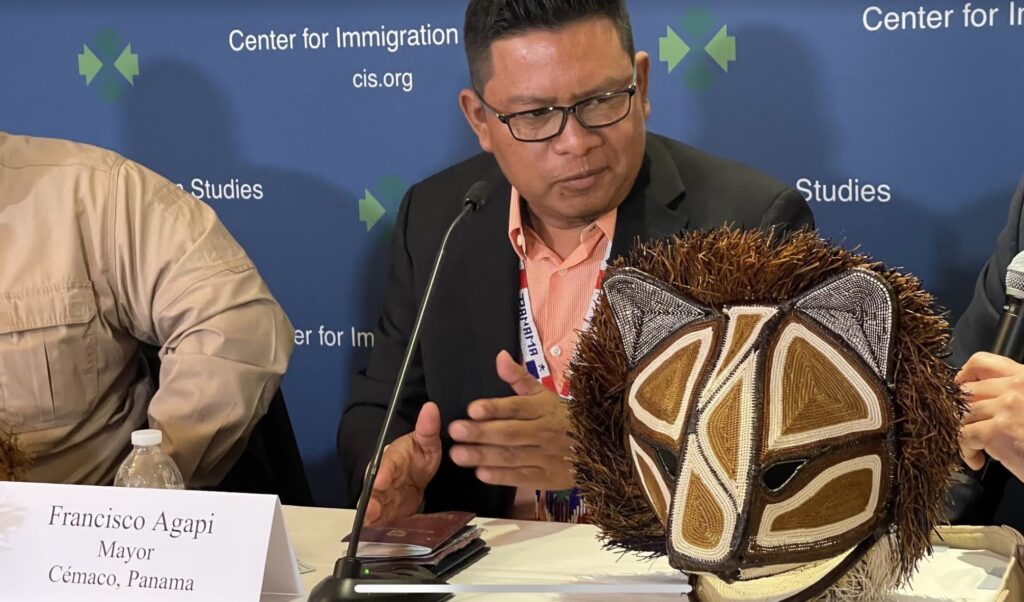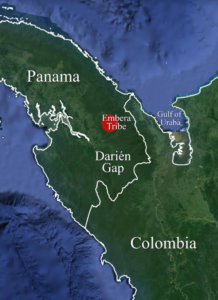
‘There are no organizations that are fighting for our human rights’
WASHINGTON, DC – The leader of the Embera Tribe left his jungle homeland in Panama’s Darien Gap and came to the nation’s capital last week with an SOS message to the American people: a record-setting mass migration through his reservation, spurred by President Joe Biden as soon as he entered office this year, is destroying the tribe’s traditional ways of life at a pace beyond living memory and corrupting its people to an entirely unacknowledged extent
Some 35,000 of the agrarian Embera live largely from jungle rivers along the Panama-Colombia border, right where the Darien Gap migrant pathways have emptied a record estimated 100,000 migrants from more than 100 nations (10 times the usual annual numbers) on their way to the U.S. southern border, a great many drawn by word of lenient Biden administration policies that show no sign of lifting in its remaining three years.
During the panel and later to several Republican members of Congress, Mayor Agapi expressed puzzlement as to why human rights groups that protect indigenous tribes – and a Panamanian government interested only in moving them into the next country – have forsaken his tribe’s new problems in favor of facilitating the historic migrant tide he believes is causing them. Front and center among these is a food insecurity crisis that developed in 2021. The Embera leader said not a single advocacy group for indigenous peoples has reached out to assess how the tribe is managing the 2021 migrant swell through its territory.
“One of the rights that we’re fighting for – human rights – is just our sustenance, because a lot of these immigrants are passing through our fields. They take a lot of our crop, so a lot of folks are without food, without crops,” Mayor Agapi explained as one ill effect of the mass migration swamping his tribe. “And we’re the only ones that are fighting for this. There are no other organizations that are recognizing that this is a problem and fighting for us.
“There are no organizations that are fighting for our human rights.”

Food insecurity has spiked not just because thousands of hungry migrants are taking the harvests. With so much easy money coming in for transporting and guiding the migrants, many Embera men have abandoned their duties to plant new crops for these new endeavors, or to hunt and fish.
“Especially in the last few months, it’s been a terrible problem for us.”
Of primary concern to Mayor Agapi is the corrupting influence of cash the migrants offer the Embera for guiding and transportation services, previously unimaginable sudden relative wealth that most young people are ill-equipped to manage.
“The problem is that, honestly, the immigrants bring money with them,” he said. “That’s the source of the problems.”
This year, the money fueled a rash of alcoholism and cocaine use among Embera youth. A typical fee for a ride aboard a motorized Embera canoe, which can carry more than 100 at a time, is $25 per migrant. Hundreds of such boats move constantly along rivers from to ferry migrants fresh out of the Gap into Embera villages and eventually into Panamanian government hands. The Panamanian government, which sees a national interest in ensuring the migrants keep moving to the next country, maintains hospitality camps near the Pan-American Highway and facilitates bus transport on it north to Costa Rica, as CIS was first to report in late 2018.
With this year’s shift to modern money, he said, the tribe’s youth are spending proceeds on cocaine and alcohol, becoming addicted and tearing families apart. Some are leaving the community for extended periods to use drugs in Panama City and transport them back to the jungle for sale to others.
“The first problem is alcohol, especially in our younger generation. So when they become alcoholics, then it becomes a family problem between married couples,” he explained.
Mayor Agapi said the Panamanian government is entirely indifferent to the tribe’s sufferings, showing only overriding interest in helping the migrants who are causing them.
In a moment of somewhat pained candor, Mayor Agapi did describe another problem besetting the tribe that has drawn government attention: some Embera men are using hunting rifles passed down from father to son for generations to rob and rape the migrants in the jungle.
During his Washington trip last week, the Embera leader said he was traveling among the villages to warn men to stop these terrible abuses. But he also acknowledged that he had little power to do much more than persuade his people that such crime is not part of Embera culture and to work with police… More here from CIS.org.

